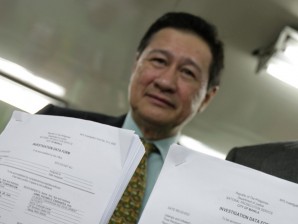
Francisco Chavez. INQUIRER FILE PHOTO
MANILA, Philippines—The Supreme Court ordered the Judicial and Bar Council (JBC) to answer the petition assailing the legality of its eight man composition and stopping the selection process for the next Chief Justice.
JBC has been given up to Monday, July 9, to submit its comment on the petition filed by former Solicitor-General Francisco Chavez.
The high court also ordered Senator Francis Escudero (chair of the Senate Committee on Justice) and Iloilo Representative Niel Tupas (chair of the House Committee on Justice) to inform the high court on the manner in which they vote on JBC deliberations. Escudero and Tupas are both ex-officio members of the JBC as representative of the legislative branch of government.
The JBC is constitutionally mandated to screen aspirants for the Judiciary and the Office of the Ombudsman. Then, they submit a short list of nominees to the President who then will make the appointment.
Chavez, in his petition, asked the high court to issue a temporary restraining order to stop the JBC from further functioning.
Chavez said the current JBC composition violates the 1987 Constitution with two representatives from Congress, namely: Senator Francis Escudero (chairman, Senate Committee on Justice) and Iloilo Representative Niel Tupas, Jr. (chairman, House of Representatives Justice Committee).
Chavez insists the composition of the JBC, the body tasked to screen applicants and nominees for judicial posts and the post of Ombudsman and Deputy Ombudsmen, should only be 7, not 8.
He stressed that the phrase “a representative of the Congress” used by the Constitution in Sec. 8, Art. VIII is “all to clear” to mean only one JBC member should come from the legislature.
“The said JBC is now in the process of preparing the final list of possible appointee for the position of Chief Justice. However, if the composition of constitutional body that screens their appointment is illegal and unconstitutional—then the appointment of the Chief Justice will be tainted with unconstitutionality,” Chavez said in his petition.
“This will affect not only the Supreme Court but the entire judicial system, which will definitely be in a state of utter chaos,” Chavez added.
The high court opted to reduce the number of days for the respondent JBC to comment as it took note of Chavez’ explanation on the time constraints “considering that (i) the JBC has to conduct proceedings to come up with a “final list of candidates for appointment as Chief Justice on or before July 30, 2012, which list the JBC will forward to the President; and (ii) the President has only 90 days from May 29, 2012 or until Aug. 27 within which to appoint a new Chief Justice.”
Currently, the JBC is composed of Senior Associate Justice Antonio Carpio (in place of the Chief Justice), Justice Secretary Leila De Lima, Escudero, Tupas, Justice Regino Hermosisima (representing retired justices of the Supreme Court), retired Court of Appeals Justice Aurora Lagman (private sector), Atty. Milagros Fernan-Cayosa (Integrated Bar of the Philippines), Atty. Jose Mejia (academe), SC Associate Justice Presbitero Velasco, Jr. (consultant), SC Associate Justice Teresita Leonardo-De Castro (consultant), and SC Court Administrator Jose Midas Marquez (consultant).
Constitutionalist Fr. Joaquin Bernas last week said that following the provision of the Constitution, the JBC members should be composed of seven only with one representative from Congress. But he admitted that it has been a practice that there are two representatives from Congress who have half a vote each or take turns in voting.
But recent JBC members from Congress have one vote each as confirmed by Tupas.